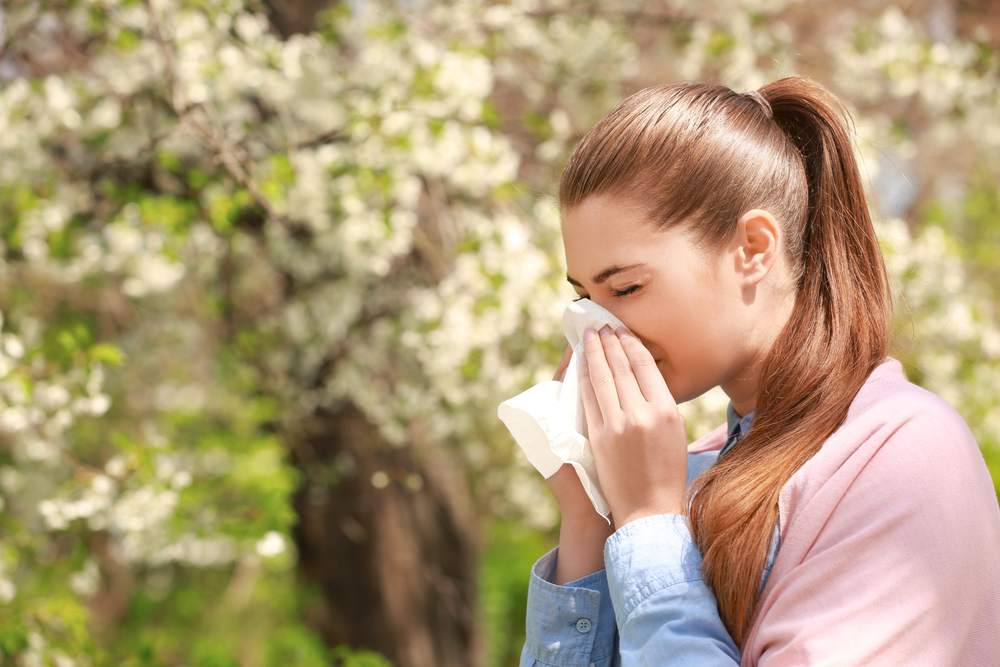When seasons change, many of us experience uncomfortable symptoms ranging from sneezing to watery eyes to headaches. When symptoms are at their worst, they can make sufferers completely miserable.
So what are seasonal allergies anyway, and more importantly, how can we find relief from seasonal allergies?

What Are Seasonal Allergies?
Allergies are a physical reaction to a substance we’re allergic to, also known as an “allergen.” When we encounter an allergen, our immune system treats it as a foreign intruder—similar to a germ or bacteria, even though the substance may be completely harmless in itself.
When we have an allergic reaction, our immune system releases chemicals—also known as leukotrienes, prostaglandins, and, most importantly, histamines. These chemicals cause us to have the well-known allergic reactions of itchiness, watery eyes, runny nose, scratchy throat, coughing, sneezing, and even congestion. In addition, we may also have skin reactions—rashes, hives, or inflammation that can be triggered or exacerbated by our allergic response.
Why do some people get allergies while others can go all season without so much as a sneeze? It’s all about the way our bodies perceive the allergen. If our bodies see certain types of plant matter like pollen or mold and dust as a threat, they will react with all their defenses.
Inside our sinuses are tiny, microscopic hair-like structures called cilia. These cilia move along mucus particles and trap foreign invaders from entering the respiratory tract. The invaders may include germs, bacteria, dirt, dust, and other irritants. In the case of seasonal allergies, the cilia trap pollen. Our mucus membranes become irritated and inflamed in reaction to the particles. We may even have trouble breathing.
Plants give off different pollens (it’s how they reproduce). Some large flowering plants often have heavier pollen, usually spread by insects. Other plants may give off lighter wind-borne pollen that can get us whenever we go outside. Most people aren’t allergic to all types of pollen; for many of us, only a select few plants cause seasonal allergy flare-ups. Unfortunately, we may not know which type of plants are causing our discomfort.
Allergy sufferers may also react to pollen brought into the house on shoes, pets, and clothing. Keeping windows closed and an air filter running can help, as can removing shoes at the door. Keep your pets out of the bedroom whenever possible, especially if they go outdoors regularly. Most allergy sufferers know that there are certain days when they feel susceptible to seasonal allergies. These are the days to stay indoors as much as possible and avoid activities that can trigger your symptoms.
Natural Remedies to Help with Allergies
Of course, some seasonal allergies seem to last all year round (and no one wants to miss out on outdoor activities to avoid allergy triggers. So what are allergy sufferers to do?
Many over-the-counter allergy treatments can cause side effects like headaches, dizziness, and even weight gain. Histamines tend to reduce the appetite, and researchers have found that antihistamines may stimulate the appetite and make us hungry. Some people also prefer more natural remedies to help with allergies.
There are several options for treating seasonal allergies with home remedies.
1. Stop Allergy Triggers in Your Home
One of the easiest ways to combat allergens is to keep them out of your home. This typically requires a high-quality air filter. Look for a HEPA filter that traps irritants like dust, dander, and pollen. In addition, air conditioning and dehumidifiers can help reduce allergen-causing mold and mildew, keeping up the air quality.
Minimize the textiles in your home—curtains, rugs, and even bed linens can be common sources of allergens. Wash sheets and bedding regularly and look for allergy preventative solutions. Wash your pets regularly, especially if they go outside, and keep them out of the bedroom when possible. Dust regularly and keep your windows closed when pollen counts are high. Similarly, consider removing shoes at the door and even changing out of outdoor clothes when entering your home.
2. Essential Oils
Certain essential oils can offer some antimicrobial protection to help alleviate your reaction to allergen triggers. Oils like peppermint and eucalyptus “open” the congested sinuses, allowing you to breathe easier when you feel stuffed up. Lavender can help you sleep, even if you feel congested and uncomfortable.
Frankincense is another favorite essential oil for allergies. Some people swear by diffusing several drops of frankincense during allergy season. Tea tree oil or Melaleuca is another healing oil many people like using. With antimicrobial and antibacterial properties, tea tree also helps to mitigate allergens caused by mold and mildew. Use it in a cleaning spray around the house.
3. Local Raw Honey
Another popular way to combat allergies is to enjoy local, raw honey. If you suffer from seasonal allergies caused by local pollen sources, the honey will contain microscopic particles of the pollen, thanks to the bees that produce the sweet treat.
Raw, unpasteurized honey is the best choice for allergy treatment because it hasn’t been filtered and still contains those micro particulates. You can find it at most health food stores. Add a tablespoon to your tea, drizzle on oatmeal, or have it on your morning English muffin during allergy season. Over time, the theory suggests you will build up a greater tolerance to local pollen triggers.
4. Probiotics
Do you take a probiotic? Some studies have shown that taking a regular probiotic can help you balance your gut flora and keep your body systems running smoothly. However, the benefits of a daily probiotic aren’t just relegated to gut health.
Some studies have explored how probiotics can also help alleviate the symptoms of allergies, particularly sinus discomfort and inflammation. Probiotics tend to lessen inflammation throughout the body, so it makes sense that they would help with the body’s inflammatory reaction to allergen triggers. For a great daily probiotic option, I suggest Melaleuca’s Florify Daily Probiotic.
5. Natural Herbs and Foods for Allergies
Natural medicine practitioners and herbalists suggest a variety of different herbs and plants for helping to combat allergies. Regular vitamins, especially Vitamin C, are crucial for overall respiratory health and may offer some relief for allergies. Many plants are rich in vitamin C, including elderberry and citrus fruits.
Butterbur, stinging nettle, and spirulina (algae) are other potential allergy relievers. Many of them can be found as supplements in health food stores. The enzyme Bromelain from pineapple and the flavonoid Quercetin found in broccoli and green tea are also natural allergy relievers.
6. Other Help for Allergies
Homeopathic treatments are effective for some allergy sufferers. Others turn to Eastern medicine, including acupuncture, as an option for reducing seasonal allergies and their uncomfortable effects. Certain types of massage can also help ease sinus pressure and reduce the flow of mucus.
Other options for treatment include saline nasal irrigation—the use of a neti pot. Many people who suffer from sinus congestion swear by these teapot-like home remedies used to gently flush the sinuses and relieve the buildup of mucus.
Immunotherapy to Help with Allergies
Another option to help relieve seasonal allergies is what’s called immunotherapy. Many people also refer to this treatment as “allergy shots.” When patients undergo allergy shots or immunotherapy, a very small amount of the allergen trigger is injected under their skin. The trigger is very diluted, allowing their body to start to “get used” to the allergen and reduce the over-reaction.
Given over the course of several treatments, immunotherapy eventually reduces patients’ sensitivity to the allergen and can ease the symptoms of seasonal allergies significantly. Of course, immunotherapy isn’t effective for all types of allergies, but for seasonal allergy sufferers, it can bring welcome relief.
When exploring immunotherapy, practitioners will often ask what other treatments patients have tried. Immunotherapy isn’t usually the first course of action, as it can be time-consuming and uncomfortable initially. The practitioner may explore changes in lifestyle that could help the patient avoid their allergen triggers. They may also ask about other allergies like insect sting reactions, allergies to certain foods and antibiotics, and other potential health concerns. For patients who have been using allergy medications for years or who have found other remedies ineffective, immunotherapy can be a favorable option.
It’s also worth noting that while immunotherapy can be effective for certain allergens, it’s ineffective for most food allergies. Immunotherapy is most helpful for pollen, dust mites, and bee venom allergies. It helps reduce inflammation and rhinitis (runny, itchy, swollen nasal passages), but it often won’t alleviate allergy reactions like hives.
Allergists may run tests before beginning treatments, including blood testing, to ensure the accuracy of the treatment. Some patients are surprised to discover that they aren’t allergic to the triggers they thought were causing their reaction.
If you regularly dread the arrival of spring or find yourself sneezing through the autumn months, explore these options to help you find relief from seasonal allergies. Don’t let your allergies stop you from enjoying warm weather. There are plenty of natural alternatives to help you feel better and breathe easier even when the pollen count is on the rise.








Leave A Reply!